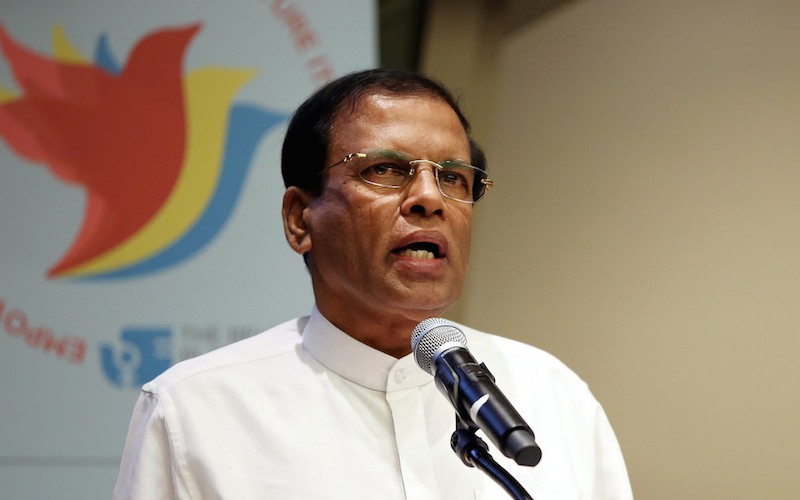
Examining Sri Lanka’s Current Political Situation
Jehan Perera is the executive director of the National Peace Council, a Colombo-based nongovernmental organization (NGO). This interview has been edited for clarity.
Would you tell us a little bit about the National Peace Council? What sorts of projects is the organization currently working on?
Since its establishment in 1995, the National Peace Council of Sri Lanka (NPC) has been committed to strengthening grassroots and community level support for a political solution to the country’s ethnic conflict and a constitutional settlement based on interethnic power-sharing.
Currently its key projects include building interreligious and interethnic bonds by working with local level NGOs and interreligious groups in 16 of Sri Lanka’s 25 districts, and with women’s groups to identify how women would want the transition from post-war to peace to be mapped out. NPC also has a people-to-people exchange program in which youth groups are the focus.
President Maithripala Sirisena took office in January 2015. What are the biggest challenges facing the current government?
The government needs to address the economic livelihood concerns of the people. Economic progress remains slow and the anticipated foreign investment and economic aid from the West has not materialized. The government is in a debt trap, due to the profligate borrowings by the previous government on unproductive investments. There is international pressure to address the ethnically divisive issues of finding a power-sharing solution between the ethnic nationalities and to ensure a transitional justice process that meets international standards of accountability.
How has Sri Lanka‘s foreign policy changed over the past eighteen months?
The previous government began to rely heavily on China for both economic assistance and to protect it from the demands of the international human rights community for wartime accountability. There was a confrontation with Western countries on the latter issue. The new government has given priority to mending its relations with the West and accommodating the demand for a post-war transitional justice process. It is closer to the West in terms of political values.
What has surprised you most about the new government’s performance?
The main thrust of the government’s campaign against those in the former government (who are now part of the opposition) was their corruption and abuse of power. But the probes into these and the legal actions against those accused of such wrongdoings are proceeding slowly. In the meantime, they are using their ill-gotten resources to mobilize street protests against the government. There is an appearance of surprising laxity on the part of the government.
There have been concerns that the government has done a poor job of communicating its agenda to the public. What’s your view? In terms of public messaging, have there been any improvements over the past couple months?
The problem of communications is in relation to the transitional justice process. Issues of post-war accountability, war crimes and power-sharing are ethnically divisive. They are not popular with the ethnic majority. Politicians do not wish to publicly take positions on controversial issues not supported by the majority.
It seems that the dominant thinking within the government is to get the building blocks in place without too much fanfare. Both the transitional justice and constitutional reform processes are ultimately public processes. So far the government appears to be subcontracting that mission to civil society groups.
How involved should international actors be in Sri Lanka’s transitional justice process?
Three-fourths of the population are Sinhalese, whose thinking on issues of transitional justice is quite the opposite of Tamils. Most of them think that eliminating the Liberation Tigers of Tamil Eelam (LTTE) and ending the civil war by whatever means was justified. This thinking is not shared by most Tamils. But as they are a minority, their views tend to be disregarded. A democratically elected government has to be deferential to majority public opinion if it is to continue in office through elections. In this context, international pressure in favor of meeting international standards in the transitional justice process is necessary to make up for the imbalance in internal political pressure.
Regarding the judicial mechanism to deal with alleged wartime abuses, do you think it’s important to include foreign judges?
There is a need for a credible and independent mechanism to ensure that justice is done and seen to be done. Initially the new government seemed agreeable to having foreign judges sit on the special court as judges. This would give the Tamil people more confidence in the accountability process. But there is strong public opinion from the Sinhalese people that the security forces and political leaders who won the war should not be tried by foreigners. Any government has to be mindful of majority opinion, especially if it is underpinned by nationalism. There could be international technical support and monitoring.
What do you expect to happen in terms of a political solution? In your view, is a federal system of devolution on the table?
The representatives of the Tamil people have long demanded federalism. The representatives of the Sinhalese people have equally long opposed it as paving the way for separation. The positive feature presently is that the leaders of the government and of the ethnic minorities, both Tamil and Muslim, are on the same page with regard to their willingness to be mutually accommodative. They appear to be understanding each other’s problems and there is a meeting of hearts and minds. But this goodwill and spirit of accommodation does not necessarily encompass the larger society. There is a need for enhanced devolution of power to the provinces to enable Tamils and Muslims to exercise a greater measure of self-determination. There also needs to be checks and balances that ensure that the possibility of abuse of power is structurally curtailed and that power-sharing happens at all levels, including the central government.
How can the international community help Sri Lanka?
There will be a continuing long-term need for international pressure to counterbalance the unequal ethnic proportions within the country, which cause politicians to give greater weight to the fears and aspirations of the ethnic majority. International monitoring will be important to keep the pressure on the government. In addition, the international community could do more to support civil society groups who champion the unpopular but rightful causes that politicians shy away from.
A version of this article was originally posted in The Huffington Post.

